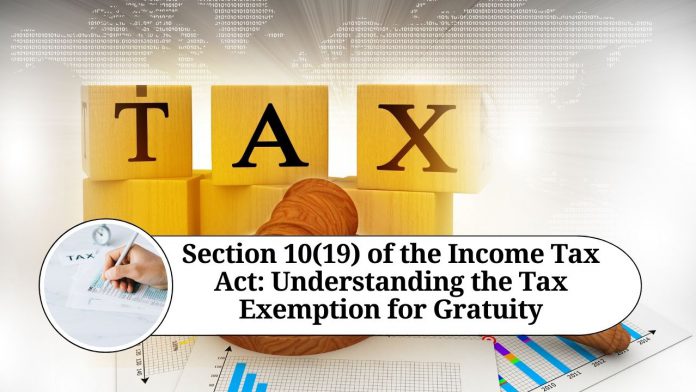Gratuity is a retirement benefit that is paid by an employer to an employee as a token of appreciation for their years of service. It is a form of monetary compensation that is paid in addition to the employee’s salary and is usually calculated based on the employee’s salary and years of service. Gratuity is an important benefit for employees and helps them secure their financial future after retirement.
However, when an employee receives gratuity, they also become liable to pay tax on it. This can reduce the actual amount of gratuity received by the employee. To address this issue, the Income Tax Act provides a tax exemption for gratuity under Section 10(19).
What is Section 10(19)?
Section 10(19) of the Income Tax Act provides a tax exemption for gratuity received by government employees, defense personnel, and employees of statutory corporations. This means that the gratuity received by these employees is completely exempt from tax.
The section applies to the following categories of employees:
- Employees of the Central Government, State Government, or Local Authority
- Defense personnel, including those working in the Army, Navy, and Air Force
- Employees of statutory corporations, including public sector companies and other entities established by an Act of Parliament or State Legislature
How does the tax exemption work?
The tax exemption under Section 10(19) applies to the entire amount of gratuity received by eligible employees. This means that the gratuity amount is completely exempt from tax and does not need to be included in the employee’s total income for tax purposes.
For example, if a government employee receives a gratuity of Rs. 10 lakhs, they do not have to pay any tax on this amount. However, if the same employee receives any other income during the year, such as salary or interest income, they will have to pay tax on that income as per the applicable tax rates.
It is important to note that the tax exemption under Section 10(19) is only available to eligible employees. If an employee does not fall under any of the categories mentioned above, they will not be eligible for the tax exemption and will have to pay tax on the gratuity received.
Conclusion
Section 10(19) of the Income Tax Act provides a tax exemption for gratuity received by government employees, defense personnel, and employees of statutory corporations. This exemption helps eligible employees save on tax and ensures that they receive the full amount of gratuity they are entitled to. If you are an eligible employee, make sure to take advantage of this exemption when you receive your gratuity payment.
Read more useful content:
- section 145 of income tax act
- section 10e of income tax act
- section 9 of the income tax act
- section 94b of income tax act
- section 206aa of income tax act
Frequently Asked Questions (FAQs)
Q: What is Section 10(19) of the Income Tax Act?
A: Section 10(19) of the Income Tax Act provides a tax exemption for gratuity received by government employees, defense personnel, and employees of statutory corporations.
Q: Who is eligible for the tax exemption under Section 10(19)?
A: The tax exemption under Section 10(19) is available to employees of the Central Government, State Government, Local Authority, defense personnel, and employees of statutory corporations.
Q: Is the tax exemption applicable to the entire amount of gratuity received?
A: Yes, the tax exemption under Section 10(19) applies to the entire amount of gratuity received by eligible employees.
Q: Is the tax exemption under Section 10(19) applicable to private sector employees?
A: No, the tax exemption under Section 10(19) is only available to employees of the government, defense personnel, and employees of statutory corporations. Private sector employees are not eligible for this exemption.
Q: Do employees need to submit any documents to claim the tax exemption under Section 10(19)?
A: Yes, employees need to submit a proof of their eligibility, such as a certificate from their employer or a government authority, to claim the tax exemption under Section 10(19).
Q: Is the tax exemption under Section 10(19) applicable to gratuity received by a legal heir or nominee of an eligible employee?
A: Yes, if an eligible employee passes away, and their legal heir or nominee receives the gratuity, the tax exemption under Section 10(19) will be applicable to the gratuity received.
Q: Can an eligible employee claim tax exemption under Section 10(19) if they receive gratuity from multiple employers?
A: Yes, an eligible employee can claim tax exemption under Section 10(19) for gratuity received from multiple employers, provided they are eligible for the exemption under each employer.
Q: What is the maximum amount of gratuity eligible for tax exemption under Section 10(19)?
A: There is no maximum limit on the amount of gratuity eligible for tax exemption under Section 10(19). The entire amount of gratuity received by eligible employees




















